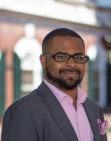In 2013, Black Lives Matter (BLM) began after the acquittal of George Zimmerman, the acquitted killer of 17-year-old Trayvon Martin in Sanford, Florida. Three queer-identified Black women—Alicia Garza, Patrisse Khan-Cullors, and Opal Tometi—delivered a call to action on social media using the hashtag #BlackLivesMatter to end police brutality and systemic anti-black racism. In 2014, the movement solidified as activists protested the police killings of Michael Brown in Ferguson, Missouri and Eric Garner in New York City. Across the world, thousands gathered and protested in solidarity with the activists of Ferguson. Consequently, Black Lives Matter has grown into an international movement that addresses a variety of issues that impact Black lives including racial inequity, mass incarceration, systemic violence, and economic injustice, among others.
In addition, BLM distinguishes itself from its forebears in the U.S. Civil Rights Movement Era as a decisively non-sectarian movement. In other words, many BLM activists are not affiliated with any organized religion unlike many of the members of the Civil Rights Movement who were predominantly Protestant Christians. Moreover, BLM is a decentralized network of smaller organizations and contains no formal hierarchy, a striking contrast with the centralized, patriarchal, and charismatic leadership style of the Civil Rights Movement. BLM leadership is inclusive of Black people of all gender identities, expressions, and sexualities and seeks to dismantle all interlocking systems of racial, gender, and sexual oppression. Consequently, BLM activists reject the patriarchy, sexism, queer-antagonism, and transphobia found in many African American Christian communities.
Despite the growing number of religious “Nones” in the movement, some BLM activists maintain affiliation with the religious traditions of their youth. During the summer of 2019, I interviewed three Black women who live on the intersection of race, gender, sexuality, and religion. During the interview, these women shared their stories and perspectives on the contributions of Black women in the Black freedom struggle and Black Lives Matter. Shakira King is a Philadelphia-based activist and educator. Shakira shares her story of how she became involved with the Philadelphia chapter of Black Lives Matter and reflects upon her upbringing as a Black queer woman in the Black Baptist Church. Jalane Schmidt is Associate Professor of Religious Studies at the University of Virginia and co-founder of the Charlottesville chapter of Black Lives Matter. Professor Schmidt offers a historical perspective on BLM and the Black freedom struggle. The Reverend Charisse R. Tucker is Minister of Administration at St. Paul’s Baptist Church in Philadelphia, Pennsylvania. As the assistant pastor of a 130-year-old Black Baptist congregation, Tucker reflects on her own journey into ministry and the leadership of Black women in both the Black Church and social-political movements.
Additional Reading
Douglas, Kelly Brown. Stand Your Ground: Black Bodies and the Justice of God. Maryknoll, NY: Orbis Books, 2015.
Gilkes, Cheryl Townsend. “If it Wasn’t for the Women…”: Black Women’s Experience and Womanist Culture in Church and Community. Maryknoll, NY: Orbis Books, 2000.
Khan-Cullors, Patrisse and asha bandele. When They Call You a Terrorist: A Black Lives Matter Memoir. New York, NY: St. Martin’s Press, 2018.
Lebron, Christopher L. The Making of Black Lives Matter: A Brief History of An Idea. New York, NY: Oxford University Press, 2017.
Lightsey, Pamela R. Our Lives Matter: A Womanist Queer Theology. Eugene, OR: Wipf and Stock, 2015.
Ransby, Barbara. Ella Baker and the Black Freedom Movement: A Radical Democratic Vision. Chapel Hill, NC: The University of North Carolina Press, 2005.
———. Making All Black Lives Matter: Reimagining Freedom in the Twenty-First Century. Oakland, CA: University of California Press, 2018.
Taylor, Keeanga-Yamahtta. From #BlackLivesMatter to Black Liberation. Chicago, IL. Haymarket Books, 2016.
Additional Credits
Special thanks to Shakira King, Professor Jalane Schmidt, Professor Paul Dafydd Jones, the Reverend Charisse R. Tucker, and the Religion, Race, and Democracy Lab. Also special thanks to The JoyBells Singers for their song, “Determination.”
(Top image) “Demilitarize the Police, Black Lives Matter, November 10, 2015” by Johnny Silvercloud is licensed under CC BY-SA 2.0.
Get Involved
Learn about forthcoming podcast episodes, newly published projects, research opportunities, public events, and more.
Potential Students


